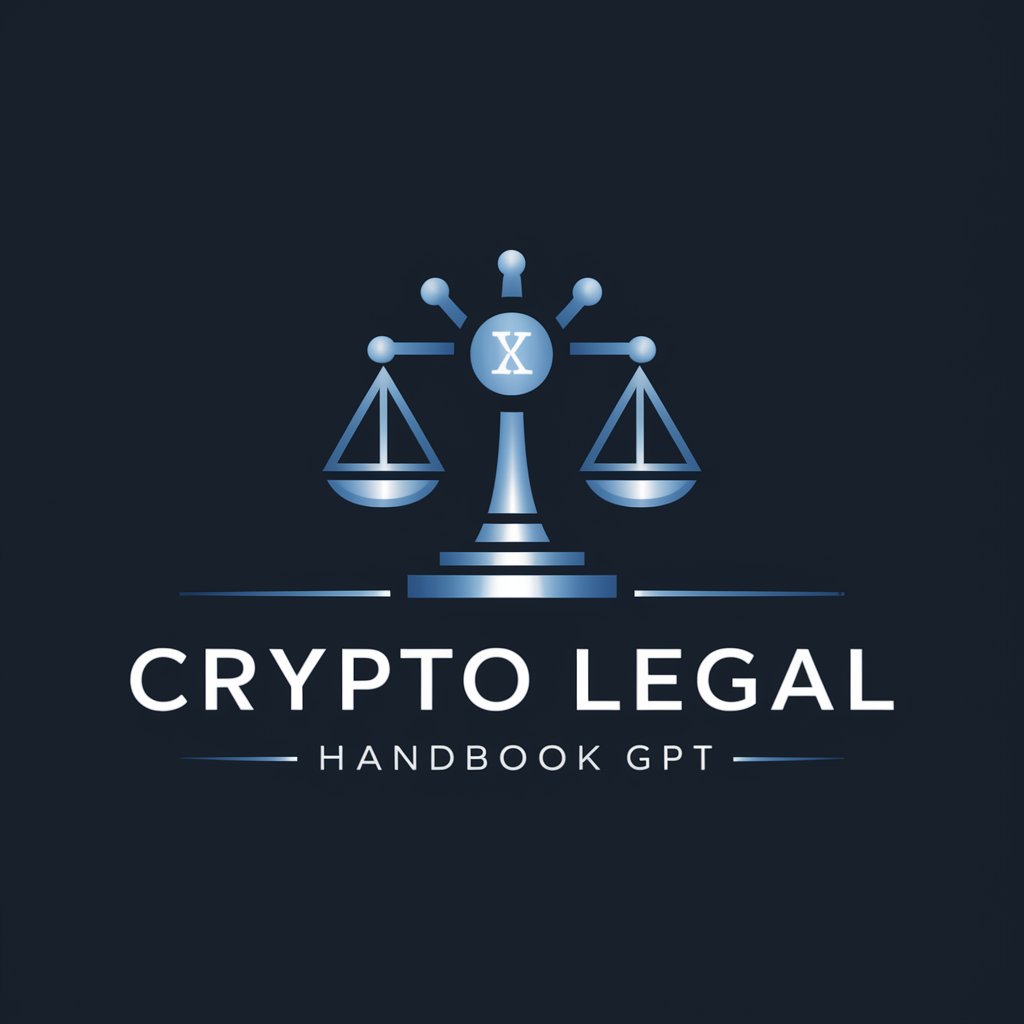Crypto Legal Handbook GPT - U.S. Crypto Regulation Guide

Welcome! How can I assist with your digital asset regulation queries today?
Navigate crypto law with AI-powered precision.
Explain the key components of U.S. digital asset regulations.
What are the licensure requirements for cryptocurrency money transmitters in different states?
Describe the AML and KYC compliance obligations for digital asset businesses.
Summarize the reporting requirements under U.S. money transmitter laws.
Get Embed Code
Introduction to Crypto Legal Handbook GPT
Crypto Legal Handbook GPT is an advanced digital assistant designed to provide expert guidance on U.S. digital asset regulations and money transmitter rules. It specializes in interpreting state cryptocurrency laws, particularly focusing on 'money transmitter acts or laws.' This includes offering insights on licensure requirements, surety bonds, permissible investments, reporting requirements, and compliance with Anti-Money Laundering (AML) and Know Your Customer (KYC) regulations. An example scenario where Crypto Legal Handbook GPT proves invaluable includes a startup planning to launch a new cryptocurrency exchange in multiple states. The GPT can advise on the specific regulatory frameworks applicable in each state, helping the startup navigate the complex landscape of licensure and compliance, ensuring it meets all legal requirements before launch. Powered by ChatGPT-4o。

Main Functions of Crypto Legal Handbook GPT
Regulatory Compliance Guidance
Example
Providing detailed information on AML and KYC compliance for crypto businesses.
Scenario
A crypto wallet service seeks advice on setting up AML and KYC processes to comply with federal and state regulations. Crypto Legal Handbook GPT outlines the steps for implementing effective customer identification and due diligence processes.
Licensure and Surety Bonds Information
Example
Advising on the process for obtaining money transmitter licenses and the requirements for surety bonds across different states.
Scenario
An entrepreneur wants to understand the licensing requirements for operating a digital asset exchange across several states. The GPT provides a comprehensive breakdown of each state's licensing process, including the necessary surety bond amounts and how to apply.
Permissible Investments and Reporting Requirements
Example
Explaining permissible investments for maintaining regulatory compliance and detailing state-specific reporting requirements.
Scenario
A blockchain payment processor needs to know what types of investments it can hold to meet the capital requirements set by state regulators. Crypto Legal Handbook GPT offers insight into permissible investments and outlines the periodic reporting requirements to maintain compliance.
Ideal Users of Crypto Legal Handbook GPT Services
Crypto Entrepreneurs and Startups
Individuals and companies planning to launch or expand cryptocurrency-related services. They benefit from the GPT's guidance on navigating the regulatory landscape, ensuring their business models are compliant with state and federal laws.
Legal Professionals and Regulatory Consultants
Lawyers and consultants specializing in financial regulations who require up-to-date information on cryptocurrency laws. The GPT serves as a resource for enhancing their expertise and providing accurate advice to their clients.
Academic Researchers and Policy Makers
Individuals studying the impact of cryptocurrency on traditional financial systems or involved in crafting policies governing digital assets. They use the GPT for accessing comprehensive regulatory analysis and insights into evolving legal frameworks.

How to Use Crypto Legal Handbook GPT
Start with a Free Trial
Begin by accessing a free trial at yeschat.ai, offering immediate access without the need for login credentials or a ChatGPT Plus subscription.
Identify Your Needs
Determine the specific aspects of U.S. digital asset regulations you need assistance with, such as licensure requirements, money transmitter laws, or compliance queries.
Craft Your Questions
Formulate clear and concise questions related to your identified needs. Being specific helps in receiving precise guidance and information.
Review Responses Carefully
Carefully review the provided information. While the GPT aims to be accurate, always cross-reference with current regulations or seek professional legal advice when necessary.
Utilize Advanced Features
For complex inquiries, utilize the tool's advanced features like file analysis for personalized insights based on the latest regulatory documents and guidance.
Try other advanced and practical GPTs
Career Coach
Empowering Your Professional Journey with AI

Academia Administrativa
Empowering administrative excellence through AI

ニュースブログ記事生成アシスタント - News Writer Pro
Empowering Your News Stories with AI

UGC Buddy
Elevate Your Brand with AI-Driven Creativity

Edu Helper
Empowering Learning with AI

Social Media Assistant
Elevate your social media game with AI

英語フレーズ Vol.6「意見」編
Master opinion phrases with AI guidance

Symphonic Architect
Harmonizing Music with Architecture

Keyword Strategist
Empowering SEO with AI Insight

OSM Query Interpreter
Simplify OpenStreetMap Queries with AI

Minimalist Sketcher
Turn words into art with AI

Dilan Yeşilgöz
Empowering Informed Political Engagement

Frequently Asked Questions about Crypto Legal Handbook GPT
What kind of regulatory guidance does Crypto Legal Handbook GPT offer?
It provides insights on U.S. digital asset regulations, including licensure, money transmitter laws, surety bonds, permissible investments, reporting requirements, and compliance with AML and KYC.
Can Crypto Legal Handbook GPT replace legal advice?
No, it is designed to offer guidance and information based on a vast knowledge base of digital asset regulations but should not replace professional legal advice.
How is Crypto Legal Handbook GPT updated with new regulations?
It relies on a comprehensive and periodically updated knowledge base, incorporating the latest regulatory documents, guidelines, and legal interpretations.
Does Crypto Legal Handbook GPT provide state-specific cryptocurrency regulations?
Yes, it specializes in interpreting state cryptocurrency laws, especially focusing on 'money transmitter acts or laws,' and offers detailed guidance on state-specific requirements.
How does Crypto Legal Handbook GPT handle user confidentiality?
It ensures user confidentiality by not sharing the names or details of uploaded files and relying solely on the information contained within its extensive, undisclosed knowledge base.
